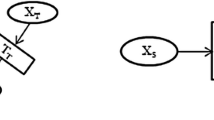Abstract
In this paper, we develop a new multiple regression analysis method for multigroup data. The model enforces some rank conditions on the matrix with regression coefficient vectors, and thus enables a parsimonious representation of group characteristics. The technique used can be considered as a hybrid approach to soft and hard parameter sharing in multi-task learning.







Similar content being viewed by others
References
Braun HI, Jones DH, Rubin DB, Thayer DT (1983) Empirical Bayes estimation of coefficients in the general linear model from data of deficient rank. Psychometrika 48(2):171–181
Davies PT (1982) Procedures for reduced-rank regression. Appl Stat 31:244–255
Goh G, Dey DK, Chen K (2017) Bayesian sparse reduced rank multivariate regression. J Multivar Anal 157:14–28
Izenman AJ (1975) Reduced-rank regression for the multivariate linear model. J Multivar Anal 5:248–264
Kruskal JB (1981) Multilinear models for data analysis. Behaviormetrika 10:1–20
Lindley DV (1970) A Bayesian solution for some educational prediction problems, III. ETS Res Bull Ser 1970:1–14
Lindley DV, Novick MR (1981) The role of exchangeability in inference. Ann Stat 9:45–58
Lindley DV, Smith AF (1972) Bayes estimates for the linear model. J R Stat Soc Ser B (Methodological) 34:1–18
Marsh LC, Cormier DR (2001) Spline regression models. SAGE Publications Inc, New York
Novick MR, Jackson PH, Thayer DT, Cole NS (1972) Estimating multiple regressions in \(M\) groups: a cross-validation study. Br J Math Stat Psychol 25:33–50
Okada K, Mayekawa S (2018) Post-processing of Markov chain Monte Carlo output in Bayesian latent variable models with application to multidimensional scaling. Comput Stat 33:1457–1473
Schwarz G (1978) Estimating the dimension of a model. Ann Stat 6:461–464
Sener O, Koltun V (2018) Multi-task learning as multi-objective optimization. Adv Neural Inf Process Syst 527–538
Shigemasu K, Mayekawa SI (1996) A Bayesian hierarchical linear model with educational applications. J Jpn Stat Soc 26:1–23
Stein C (1956) Inadmissibility of the usual estimator for the mean of a multivariate normal distribution. Stanford University, Stanford
Van den Wollenberg AL (1977) Redundancy analysis: an alternative for canonical correlation analysis. Psychometrika 42:207–219
Watanabe S (2013) A widely applicable Bayesian information criterion. J Mach Learn Res 14:867–897
Author information
Authors and Affiliations
Corresponding author
Additional information
Communicated by Wim J. van der Linden.
Publisher's Note
Springer Nature remains neutral with regard to jurisdictional claims in published maps and institutional affiliations.
About this article
Cite this article
Mayekawa, Si., Yamashita, N. Bayesian reduced rank multigroup regression analysis: a new model for multigroup data with hybrid parameter sharing. Behaviormetrika 47, 411–426 (2020). https://doi.org/10.1007/s41237-020-00112-w
Received:
Accepted:
Published:
Issue Date:
DOI: https://doi.org/10.1007/s41237-020-00112-w




